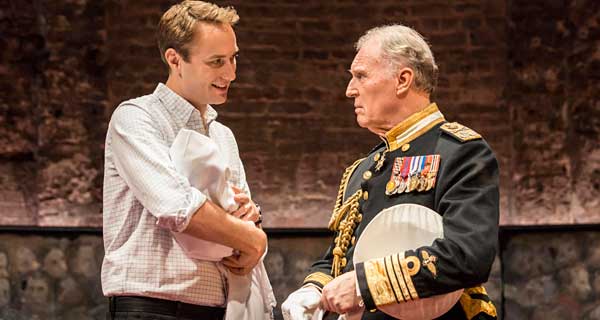
King Charles III
Almeida Theatre, shortly to transfer to the West End
16 May 2014
5 Stars
Interval. The tall suited man to the right yawns, stands, and says, somewhat derisively, to his similarly attired and yawning companion: “That’s not blank verse. For fuck’s sake. It doesn’t even rhyme.” It took some real restraint not to burst that particularly obtuse bubble of misplaced superiority. But, perhaps thankfully, there were other, more diverting things to do.
In the slow progress to the Interval bar, there are many conversing groups, many different views. “I am a royalist and this is a travesty. Good acting mind.” “I’d shoot the lot of them but this is a bit rough. Bloody good actors though.” “I know Charles, you know. Nothing like that. Actor’s doing a good job though.” “The monarchy is pointless so the play is doomed. Actors are wonderful though”.
It says something when the audience is so uncertain about the play, but apparently unanimous about the quality of the actors. Mike Bartlett’s “future history play”, Charles III, now playing at the Almeida Theatre in its premiere, directed by Rupert Goold, is, whatever way you look at it, a remarkable piece of theatre. It’s not a great play, nor is it a play likely to have a long life or endless revivals – but it is a magnificent theatrical spectacle for this decade, this time. For now.
In many ways, it evokes the spirit of Shakespeare and thereby gives itself a heightened sense of importance. The blank verse almost does that on its own; somehow the discipline of the writing results in the audience paying more attention, regarding the material more seriously, being hesitant to laugh, but then understanding the genre and accepting it.
But it’s not just that. There are threads from so many of Shakespeare’s plays and aspects of many of his key characters. Charles owes much to King Lear and Richard II and there is more than a touch of Volumnia about Camilla. There is no mistaking the Hal in Prince Harry, the Lady Macbeth in Kate, the Hamlet and Angelo in William, the Bolingbroke in Prime Minister Evans – even Diana has a turn as a kind of ghost/witch from Hamlet or Macbeth. None of this is accidental – and it is genius to take those elements and seamlessly, almost invisibly, sew them into the texture and representation of real life figures everyone alive has an opinion about.
The Shakespeare effect continues with the use of supporting characters to provide homespun wisdom or comic effect – the natural successors to the Porter, the Gravedigger and the Nurse are all here. As are the whispered confidential exchanges between those powerful leaders who want particular outcomes so familiar to those who know the exchanges between Cassius and Brutus or any number of Lords in the History plays.
But this is not Bartlett’s only skill here. The play is a genuine thriller, with twists and turns that are both wholly unexpected and ravishingly intricate and enthralling. The wonderful surprise half-way through Act Two is breath-taking, worth the whole evening. And there are plenty of laughs along the way – but once the tide finally turns against Charles, the high tragedy is never funny, but always utterly mesmerising.
The play does not have anything particularly new to say about the monarchy, Britain or anything else, but the real skill here is that something close to familiar is made to look and feel exotic.
Everything about Goold’s production works. From the funereal ceremonial opening, at the service marking the passing of Elizabeth II, through the scenes in the Palace and in Parliament to the final, remarkable and moving, coronation sequence, the grandeur pedal is firmly pushed. Tom Scutt’s spare, simple design ensures that the audience is always aware of the religious and state overtones to every scene, the hovering constant presence of the crown as well as the ever present judgment of the people.
Jocelyn Pook provides glorious music which is absolutely perfect for the grand and raw emotions, the twists, turns and sense of history. The music wraps and envelops the action, providing comfort and stylish underscoring.
And the audience is right – the acting ain’t half good. Indeed, it is triumphantly good.
Tim Piggott-Smith is sensational as Charles. Bewildered, bemused, benign, baleful, boggled, boastful, belligerent and besieged – he is outstanding in absolutely every way and in every scene. The torrent of passion he unleashes is astonishing. This may be the performance of his life. It’s a towering, potent achievement.
He has rock solid support from Oliver Chris’s delicious under-estimated William ( Chris’s faultless handling of the surprise in Act Two is worth an Olivier Award), Richard Goulding’s desperate and lost Harry, Lydia Wilson’s wonderfully scheming, hair-flicking Kate, Adam James’ prickly prick of a Labour Prime Minister, Nicholas Rowe’s openly duplicitous silver-spoon-up-arse Tory Opposition leader, Margot Leicester’s faithful but bovine Camilla and Katie Brayben’s delicious, devious Diana. Each is quite phenomenally good – and often unexpectedly so.
This is theatrical alchemy of the rarest kind.
It will affect each person who sees it differently, for it is everything and nothing all at once. A possible timeline, a fantasy, a parable, a joke, an extrapolation on known facts, a serious state-of-Britain musing: it can be seen as all of these things or none of them, depending on your point of view.
In truth, it is an occasion for good actors to do great work.
And these actors do not miss the occasion.
It’s sold out at the Almeida but really should transfer – it could play anywhere, at least in the years before the current monarch dies. If you get the chance – see it.
STOP PRESS – King Charles III has announced its transfer to the Wyndhams Theatre. Book Now!
